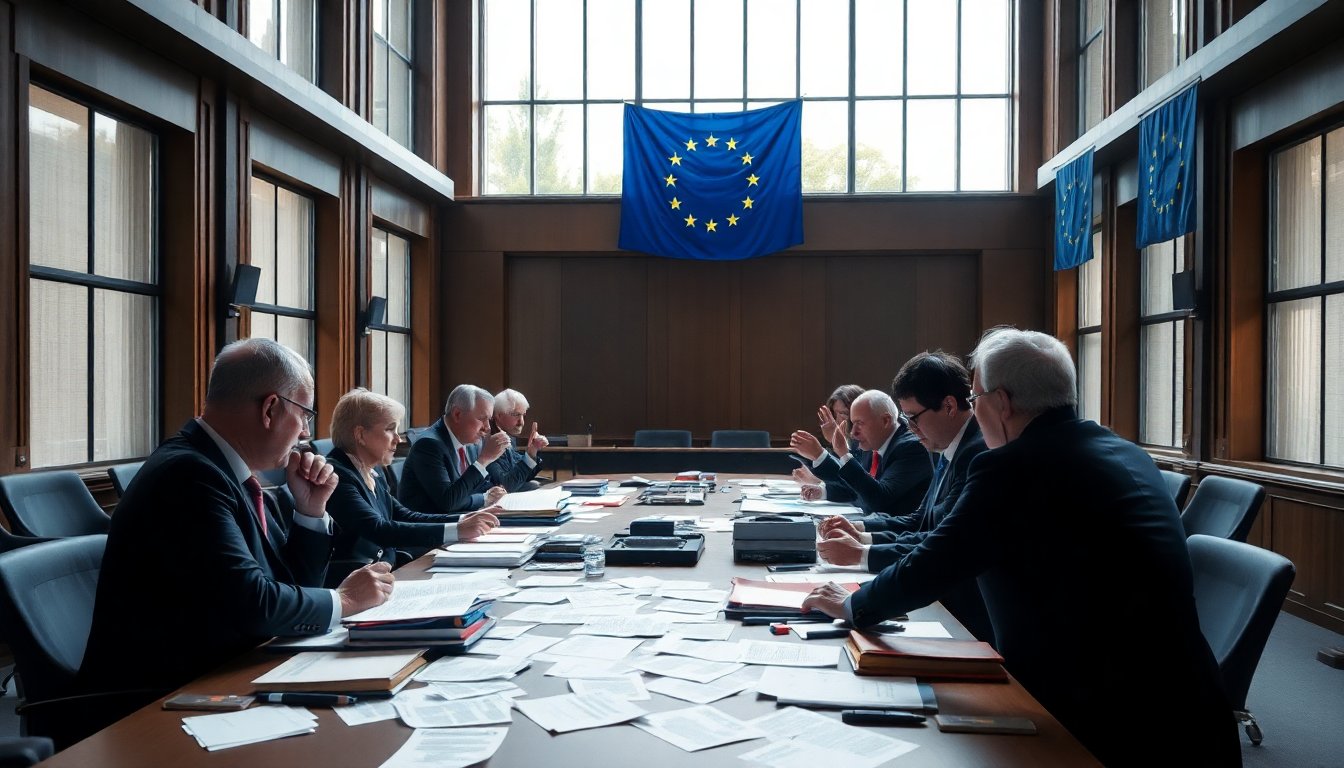Table of Contents
In a significant setback for the European Union, discussions surrounding a crucial simplification bill came to a halt, revealing underlying divisions within the coalition that supported Ursula von der Leyen’s reelection as Commission President. The anticipated overnight session, aimed at reconciling differences on the first omnibus simplification package, ended prematurely after just a few hours of contentious dialogue.
Lawmakers representing various political factions entered the meeting with hopes of reaching a consensus on rolling back certain EU green regulations. However, tensions quickly escalated, leading to a breakdown in communication among key players, including the center-right European People’s Party (EPP), the centrist Renew group, and the center-left Progressive Alliance of Socialists and Democrats (S&D).
Negotiations falter amid conflicting interests
The EPP, a dominant force in the coalition, indicated its willingness to collaborate with right-wing factions to implement substantial reductions to regulatory frameworks. This strategy was contingent upon the acceptance of a more moderate alternative by its traditional allies, the Renew group and S&D. While the Renew party showed some openness to compromise, the S&D firmly rejected the proposed cuts.
At the heart of this legislative struggle is the objective of the omnibus bill, which seeks to alleviate reporting burdens on businesses concerning sustainability disclosures and supply chain transparency. The initiative aligns with von der Leyen’s agenda to enhance the EU’s competitiveness and stimulate economic recovery during her second term in office.
Competing visions for business regulation
Jörgen Warborn, the EPP’s lead negotiator, reiterated the coalition’s commitment to reducing operational costs for companies. “My aim has always been to streamline processes and minimize expenses for businesses. I have introduced two proposals that accomplish this,” he stated. The first proposal, which would exempt a larger number of companies from reporting their environmental impact, has garnered support from right-leaning groups.
Warborn emphasized, “I am open to any majority that prioritizes cost reduction for businesses and bolsters Europe’s competitive edge.” This statement underscores a shifting landscape within the Parliament, where the EPP has recently considered forming alliances with more conservative and far-right entities on certain issues.
Voices of dissent and the path forward
Lara Wolters from the S&D expressed frustration during the discussions, noting, “There was no constructive dialogue, only threats and posturing.” She urged her colleagues to focus on substantive negotiations rather than theatrics, highlighting the seriousness of the matters at hand.
Pascal Canfin, a member of the Renew party, criticized the far-right’s approach, labeling the first option as “completely unacceptable.” The potential fallout from this legislative impasse could have lasting implications for future negotiations, as this bill represents a critical test of cooperation among the three parties.
Key issues at stake in the omnibus bill
Central to the contention is the EPP’s push to eliminate the so-called civil liability framework, which holds companies accountable for potential environmental and human rights infractions within their supply chains. The European Commission has proposed the removal of this liability from the omnibus package—a stance that aligns with the views of EU member governments. In contrast, the S&D and the Greens advocate for maintaining this accountability mechanism to ensure corporate responsibility.
Kira Marie Pieter Hansen from the Greens criticized the EPP’s flirtation with far-right elements, asserting, “We have consistently approached negotiations constructively, while the EPP has often leaned toward the far-right and threatened to forge an alternative majority.” This ongoing tension reflects broader ideological divides within the European Parliament, which could impact subsequent legislative efforts.
Lawmakers representing various political factions entered the meeting with hopes of reaching a consensus on rolling back certain EU green regulations. However, tensions quickly escalated, leading to a breakdown in communication among key players, including the center-right European People’s Party (EPP), the centrist Renew group, and the center-left Progressive Alliance of Socialists and Democrats (S&D).0


